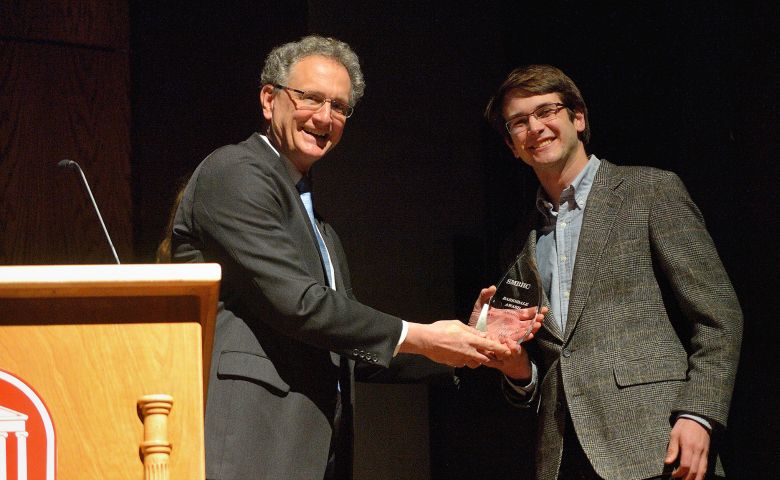Two University of Mississippi students have been chosen to pursue adventures in experimental learning in Uruguay and across North America.
Joe Bell, a sophomore from Gloucester, Massachusetts, and Kate Lindsay, a junior from Starkville, both students in the UM Sally McDonnell Barksdale Honors College, are the 2015 winners of the Barksdale Awards. They were announced as the 17th and 18th winners of the prestigious awards Tuesday evening (Feb. 10) during the Honors College spring convocation at the Gertrude C. Ford Center for the Performing Arts.
The $5,000 award supports creative, courageous projects developed by students who are willing to take risks with their time and efforts for ambitious, independent programs of study, research or humanitarian work. The Barksdale awards were established in 2005 to encourage students to test themselves in environments that don’t have the built-in safeties of a classroom, teaching lab or library.
Douglass Sullivan-Gonzalez, dean of the Honors College, describes the award as an opportunity to take on a task and put yourself where the problem is acute. All students who apply for the Barksdale Award have helped us “dream a little bigger and brighter,” he said.
“From horseback and from the campfire, Joe will be recording cultures already on the margins and, perhaps, soon to disappear, Sullivan-Gonzalez said. “Kate, too, will be reporting from the margins, this time between the deaf world and the hearing world. The stage she has chosen is the stage itself.
“Both Joe and Kate are genuine, self-directed citizen-scholars. They’re folding their academic training into experience and evolving public space, in an effort to bring us all closer to what is happening and what could happen.”
Bell, fluent in Spanish and an accomplished equestrian, will travel to Colorado, California and Uruguay to live and work among cowboys and gauchos and experience the world from their point of view. From his experience, he hopes to explore how labor policy, agricultural policy and the globalization of food systems affect both groups.
Bell says that the award will allow him to pursue his passion for people and the natural environment.
“I am intrigued and inspired by the independent and somewhat tragic lives of the North American cowboy and the Uruguayan gaucho,” said Bell, who is majoring in international studies, public policy leadership and Spanish. “These two entities, although separated by an almost hemispheric landmass, have long suffered from the same cultural, economic and legal marginalization.”
John Winkle, professor emeritus of political science, calls Bell’s project a personal challenge to pursue unbridled adventure and embrace the independent spirit.
“Joe Bell is the only Honors College student whom I have taught or known in 17 years who could complete this proposed research project,” Winkle said. “He is a first-rate equestrian, he speaks Spanish well and he understands the expectations of the research enterprise. He will succeed.”
Lindsay is a double major in theater arts and accountancy. She began studying American Sign Language in 2013 as a degree requirement. Quickly gaining a newfound respect for the deaf community through her studies, she began exploring the language and culture outside the classroom and found ways to incorporate ASL into other areas of her academic life.
In seeking new methods of collaboration between deaf and hearing theater artists, Lindsay will travel to Los Angeles, New York City and Washington, D.C., to participate in theater by the deaf, for the deaf and about the deaf.
“My purpose is to be a part of a movement to create theater that bridges the cultural divide between deaf and hearing people, not only making theater more accessible to deaf audiences but also raising awareness of the deaf community in America,” she said.
Having worked on numerous theater productions at UM, Lindsay joined Michael Barnett, associate professor and assistant chair of theatre arts, as an assistant on a production of “Titus Andronicus” in Washington, D.C., featuring deaf actors and crew members.
Although 21st century theater has pursued diversity in casting and subject matter, little attention has been focused on the integration of those with disabilities, Barnett said.
“Kate’s project will place her at the forefront of a movement which is beginning to be discussed within the industry and in the pages of its trade publications,” said Barnett, who is directing Lindsay’s honors thesis. “This is very exciting work.”
Kelley Norris

